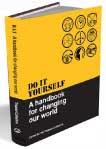

|
Do It Yourself Edited by the Trapese Collective, 2007, Pluto Press.
Nine aspects of building this future have been highlighted in sections of this book, including low impact living, education, health, food production, direct action, autonomous spaces, alternative media and others (admittedly not exhaustive, but this book could go on forever and be a thirty volume set). Each section is written by different writers who are currently working in that area, and is in two parts – one introducing the themes and issues relevant to the topic, the second part about practical responses to it. Some sections include how-to guides on such topics as managing domestic water use, setting up a community garden or running a direct action campaign, while other sections are more given to discussions on logistical and organisational problems such as group power dynamics – eg what to do if an alpha male tries to take over your group. If the goal of this book is to help pissed-off but self-motivated people in Britain and elsewhere overcome despair and cynicism and become proactively politically involved and ecologically and socially responsible, then it works very well. Believe it or not you jaded old hacks out there, new people will get involved and a dog-eared copy of this book will be on their shelf. But while not wanting to go on about what this book isn't, it is true that all the new people it may attract to activism will need to go elsewhere to fill in the gaps to the many questions which it leaves unanswered: for instance – a decentralised, localised transport system sounds fine – but what about a decentralised DIY judicial system? Because while the overall levels of alienation would be much lower in our new future, there will nonetheless still be sociopaths and criminals. What structures do you put in place to deal with them - and in fact what structures do you put in at all? What system of exchange do you have which is not profit-driven market capitalism, given that the exchange of produce is inevitable and necessary? Nations and borders must go, but is it going to be federations of communities and if so how do they all negotiate/exchange/resolve conflicts? One community's crops fail – is there a welfare safety net provided by the others? And so on... This is where the other twenty-nine volumes would come in. This book will no doubt spark debate because of the emphasis it has put on different aspects, as well as what it has omitted to tackle. For instance, many would put direct action campaigning at the absolute heart of DIY-anarchist politics – and rightly so – but while this book certainly has a very useful section on it, it is the final section, almost like the naughty kid at the back of the class. The sections on cultural activism, education, media, health etc all get the same length and billing as the one on direct action. But then the logic behind this – and indeed a major theme of this book - may be contained in the title of the first chapter: 'Why we need holistic solutions for a world in crisis'. There are many fundamental aspects to building a sustainable future, and some of them don't involve locking-on or digger diving – in fact some are outside what we normally call 'activism', and are more everyday, but nonetheless equally crucial (eg health and education). Therefore it is equally necessary to put that same 'fire-in-the-belly' DIY-spirit into a whole spectrum of efforts, and reach out to many outside the 'activist milieu', if we are to have half a chance of contributing to turning this around. For more see www.handbookforchange.org |
|
SchNEWS, PO Box 2600, Brighton, BN2 0EF, England Phone +44 (0)1273 685913 email: schnews@brighton.co.uk @nti copyright - information for action - copy and distribute |
|
 Do
It Yourself is a handbook for activists – both newcomers
as well as veterans of one form or another of political activity
who want to explore other areas. Appearing in 2007, it reflects
many of the issues current to the 'activist milieu' in the 'global
north' as we stand on the edge of the precipice facing peak oil,
climate change, loss of public spaces, food miles and all the other
features of late, late neo-liberal capitalism. The book's focus
is not on the full details of these pending catastrophes –
it leaves this to other publications – but on the ideas and
practical issues around getting actively involved - in a hands-on
way - in the political networks who are playing their part in the
mammoth job of a global transformation towards a sustainable future
both ecologically and socially, as well as economically.
Do
It Yourself is a handbook for activists – both newcomers
as well as veterans of one form or another of political activity
who want to explore other areas. Appearing in 2007, it reflects
many of the issues current to the 'activist milieu' in the 'global
north' as we stand on the edge of the precipice facing peak oil,
climate change, loss of public spaces, food miles and all the other
features of late, late neo-liberal capitalism. The book's focus
is not on the full details of these pending catastrophes –
it leaves this to other publications – but on the ideas and
practical issues around getting actively involved - in a hands-on
way - in the political networks who are playing their part in the
mammoth job of a global transformation towards a sustainable future
both ecologically and socially, as well as economically.